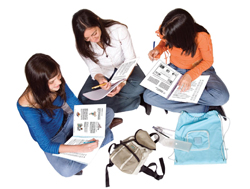In today’s world, especially with an unprecedented number of NEETs - young people not in education, employment or training – it becomes clear that it is imperative that the education of young people focuses not just on grades but on developing the whole person – encompassing their spiritual, physical, intellectual, emotional and social skills and competencies. Formal levels of qualification become filters and, all other considerations being equal, the selection of one candidate rather than another may well boil down to a person’s character traits.
The past few years have revealed unacceptable behaviours that are of deep concern to many. Trust has been badly eroded as evidenced by numerous people in the limelight, including politicians, police officers, bankers, journalists, sports stars and other celebrities. Calls for transparency and greater accountability prop up standards of behaviour but, whether on the public stage or in private, each of us has to take responsibility for our choices. We will all make mistakes. What we need to ensure is that our children are growing up in supportive, enlightened home and school environments in which they are learning about and exploring options so that when the time comes, they have a strong moral compass and can respond to situations confidently, ethically and in informed ways.
Real-life, experiential, student-centred learning
Individually and collectively we are constantly making decisions with ramifications on our personal lives, our relationships, the societies in which we live and our stewardship of the environment. It takes time to arrive at a set of principles that we feel we want to live by and standards that will serve us well. It is important therefore that from a young age, children are regularly given plenty of opportunities to explore, discuss, practise and apply a wide range of values in order to establish these anchors.
When values education is delivered well, as an integral part of the curriculum, children can become progressively more ‘fluent in values’. This explicit, systematic part of schooling heightens their awareness and they begin to consciously choose certain values to act as guideposts and reference points for their thinking, feelings, decision-making and behaviour. Take, for example, the following six challenging topics that can have profound effects on a person’s wellbeing and reflect upon what underpins your decisions about them in respect of your own life and impacts on society.
- Alcohol
- Drugs
- Exercise
- Obesity
- Sex
- Smoking
As young people consider these and other significant matters, share their ideas and express their concerns, the formulation of fruitful outcomes can be enhanced via additional activities such as real-life or fictional stories and films, drama and role play, poetry, games, art, music, projects, their own investigation and others’ research. Time set aside for quiet reflection and review is also very productive and beneficial. Naturally, some of the experiences are deeply personal but the gradual progress and rewards that come from undergoing high quality values education can be life changing.
Values from different perspectives and in different contexts
When looking into the complex matter of values, it is helpful to have some devil’s advocates prompting focus and reasoning from different angles and perspectives. This is where Rudyard Kipling’s “six honest serving men” whose names are WHAT? and WHY? and WHEN? and HOW? and WHERE? and WHO? can play a useful part in advancing understanding.
As you select a value for examination or as a theme for a while, try pairing it up – positive and negative – and then invite participants to use the six serving men to expose the realities, impacts and issues associated with the two values. For example:
- Truth and Untruth
- Peace and Unrest
- Love and Hate
- Right Action and Wrong Action
- Non-violence and Violence
You might like to start with your school’s espoused values and when communicating with parents/carers and others who are part of the school community and support services, encourage them to take up the particular exercise with the children in their contexts.
The study of values is revealing and affords extensive personal growth. During the process children enjoy learning about themselves and others and their mindsets change. The practice helps to develop a basis for consistency and adds a rich seam that can be drawn on especially during Spiritual, Moral, Social and Cultural (SMSC) development, Personal, Social, Health and Economic (PSHE) education, Citizenship sessions and Social and Emotional Aspects of Learning (SEAL).


















